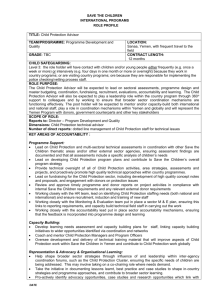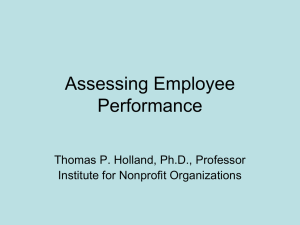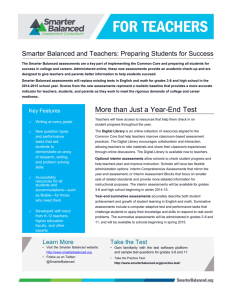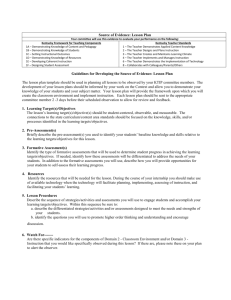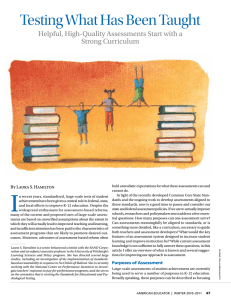Letter to the Editor on Assessment
advertisement
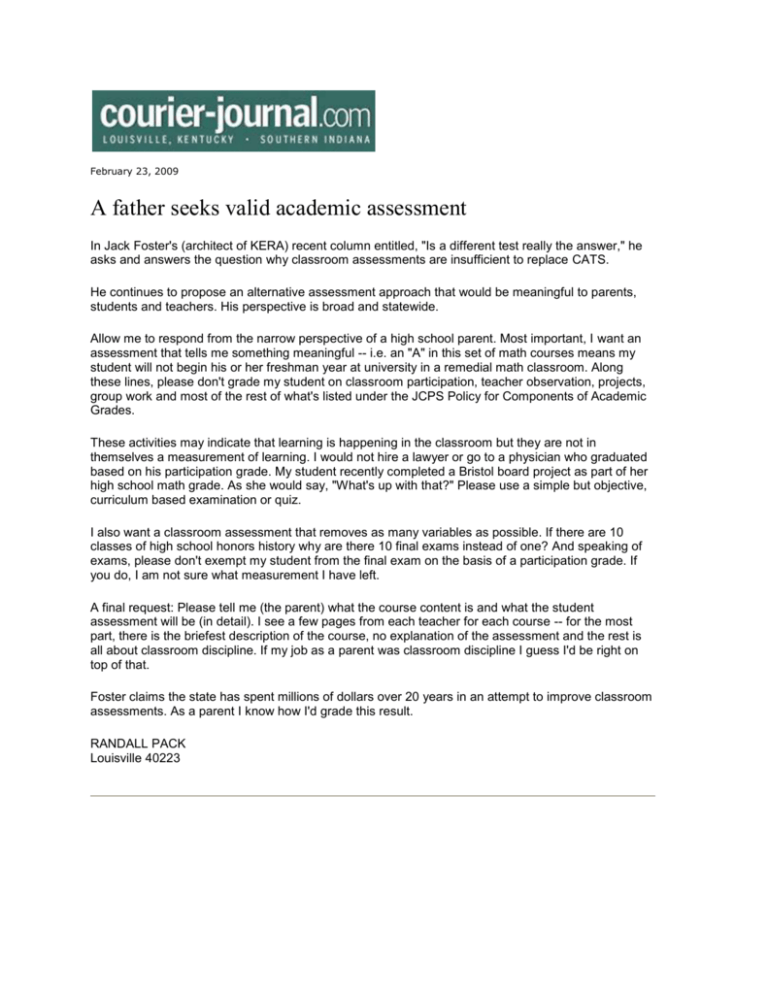
February 23, 2009 A father seeks valid academic assessment In Jack Foster's (architect of KERA) recent column entitled, "Is a different test really the answer," he asks and answers the question why classroom assessments are insufficient to replace CATS. He continues to propose an alternative assessment approach that would be meaningful to parents, students and teachers. His perspective is broad and statewide. Allow me to respond from the narrow perspective of a high school parent. Most important, I want an assessment that tells me something meaningful -- i.e. an "A" in this set of math courses means my student will not begin his or her freshman year at university in a remedial math classroom. Along these lines, please don't grade my student on classroom participation, teacher observation, projects, group work and most of the rest of what's listed under the JCPS Policy for Components of Academic Grades. These activities may indicate that learning is happening in the classroom but they are not in themselves a measurement of learning. I would not hire a lawyer or go to a physician who graduated based on his participation grade. My student recently completed a Bristol board project as part of her high school math grade. As she would say, "What's up with that?" Please use a simple but objective, curriculum based examination or quiz. I also want a classroom assessment that removes as many variables as possible. If there are 10 classes of high school honors history why are there 10 final exams instead of one? And speaking of exams, please don't exempt my student from the final exam on the basis of a participation grade. If you do, I am not sure what measurement I have left. A final request: Please tell me (the parent) what the course content is and what the student assessment will be (in detail). I see a few pages from each teacher for each course -- for the most part, there is the briefest description of the course, no explanation of the assessment and the rest is all about classroom discipline. If my job as a parent was classroom discipline I guess I'd be right on top of that. Foster claims the state has spent millions of dollars over 20 years in an attempt to improve classroom assessments. As a parent I know how I'd grade this result. RANDALL PACK Louisville 40223 February 19, 2009 Is a different test really the answer? By Jack D. Foster Special to The Courier-Journal The Kentucky General Assembly currently is debating how to improve the state accountability testing system. This is not a new issue. Academic performance tests administered only once a year have been a controversial issue for policymakers and educators for decades, regardless of their nature. Critics of these tests argue that the results often do not reflect what is actually taught or what students really know and can do, and they are not timely enough to be useful to students, parents or classroom teachers. They further argue that they require an inordinate amount of teacher and student time that could be better used for instruction. Finally, the results don't matter to students who take the tests. So why do we continue to expend large sums of money on a testing system that no one seems to like and doesn't help children learn? Why don't we use the grades that teachers regularly report to parents rather than the results of an expensive proxy test administered once a year? The answer is simple. Policymakers don't trust the results of assessments teachers give as part of the regular instructional process. Every member of the General Assembly can tell stories about "easy" and "hard" graders when they were in school. Undoubtedly, they still think some teacher grades are a farce. Hence, they are not willing to trust them as a valid measure of student performance for accountability purposes. On the other hand, policymakers might have good reason to be concerned about using the results of these tests for accountability purposes. Observations of assessment practices made in the course of state-administered reviews of Kentucky's public schools, even high-performing ones, confirms the quality of assessments prepared and administered by teachers is uneven at best. The state has spent millions of dollars since 1990 in an attempt to improve the quality and validity of classroom assessments, and still we have problems in this area almost 20 years later. This is an issue policymakers must address, and now might be that time. Rather than continue to search for a cheaper and less time-consuming state testing system that is not helpful to students, parents or teachers, I believe it is time to find a way to improve the reliability and validity of classroom assessments so they can be used for accountability purposes and eliminate the need for a separate testing system for state accountability purposes. How might this be done? I propose that classroom assessment responsibilities be given to a cadre of specialists who would administer state-designed assessment instruments at regular intervals throughout the year in every classroom in the commonwealth. The content of these tests would be tightly integrated with classroom instruction and be directly aligned with state core content standards for each subject and grade level. Teachers would continue to assess student progress on a daily basis, but report card grades would be based on the results of these tests, thus motivating students to do their best on them. Finally, "grading" of student classroom learning would be uniform and comparable among all classes, schools and districts across the commonwealth. Data generated by these tests could be aggregated and analyzed for school, district and state accountability purposes and to improve the assessment instruments, while eliminating the need for a separate, once-a-year state test. This approach has many potential benefits. It could relieve teachers of the time-consuming task of creating, administering and scoring their own classroom assessments for which they have insufficient time and expertise; provide greater consistency across the state in what is tested and how it is tested in each subject at each grade level; provide almost immediate feedback to students and teachers to improve learning and instruction; bring a high level of rigor and validity to classroom assessments; reinforce a focus on teaching core content; and the tests would matter to students. Money currently spent on CATS could be used to develop the classroom assessment instruments and money currently spent on teaching assessment skills to teachers could be used to support a cadre of assessment specialists throughout the state. Much of the testing could be done electronically. The transition from a CATS-like accountability system to one envisioned here must be carefully planned and should be developed in parallel with a revision of the core content standards that has been proposed. Doing it right is more important than doing it quickly. I sincerely encourage our legislative leaders to take a serious look at a potentially better approach to accountability than continuing to invest millions of dollars in "off-the-shelf" tests and never address the long standing problems we have with both state and classroom assessments. Obviously this is not a "quick fix" to an unpopular assessment system. However, it would break new ground in state assessment policy like KERA did in 1990, and could once again put Kentucky at the forefront of innovation in education policy in the United States. Jack D. Foster is former secretary of education and humanities for Kentucky. He was an architect of the Kentucky Education Reform Act.



